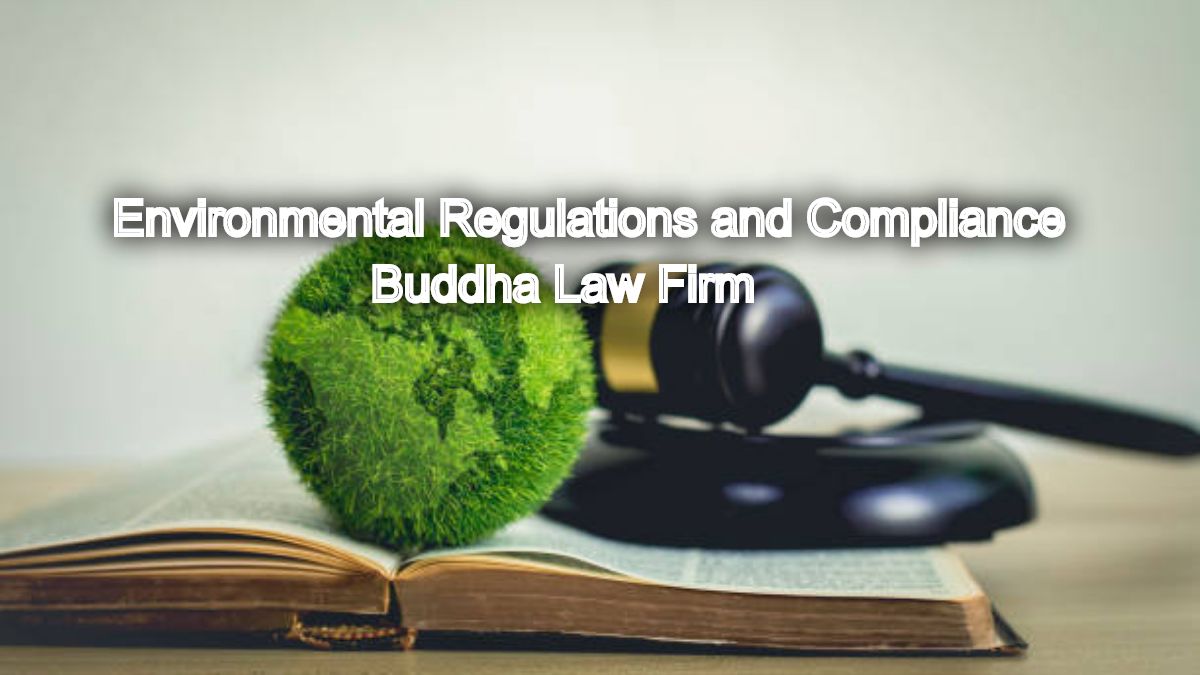Environmental Regulations and Compliance: In today’s world, businesses operate under increasing scrutiny regarding their environmental impact. Therefore, understanding and complying with environmental regulations becomes paramount. Indeed, failing to adhere to these laws can lead to severe penalties, reputational damage, and even business closure. Consequently, proactive environmental compliance is not just a legal obligation but also a crucial aspect of sustainable business practices.
Environmental Regulations and Compliance: Ensuring Your Business Stays on the Right Side of the Law with Buddha Law Firm
Understanding the Scope of Environmental Regulations
First, let’s explore the scope of environmental regulations. These regulations cover a wide range of areas, including air and water pollution, waste management, hazardous materials handling, and land use. To illustrate, businesses must obtain permits for discharging pollutants into the air or water. Similarly, they must follow strict guidelines for storing and disposing of hazardous waste.
Furthermore, environmental regulations often vary depending on the industry and location. Specifically, manufacturing plants, chemical companies, and construction firms face stringent regulations due to their potential environmental impact. Thus, businesses must stay informed about the specific regulations applicable to their operations.
Moreover, international treaties and agreements also influence national environmental laws. For instance, agreements on climate change and biodiversity conservation shape domestic regulations. Consequently, businesses operating globally must comply with both national and international environmental standards.
The Importance of Compliance
Now, let’s delve into the importance of environmental compliance. Compliance ensures that businesses minimize their environmental footprint and contribute to sustainable development. In addition, it protects public health and natural resources from pollution and degradation.
Specifically, compliance helps businesses avoid legal penalties, such as fines, injunctions, and criminal charges. Also, it enhances their reputation and builds trust with customers and stakeholders. In other words, environmental responsibility is increasingly becoming a key factor in consumer purchasing decisions.
Furthermore, compliance promotes operational efficiency and cost savings. For example, implementing waste reduction and energy efficiency measures not only benefits the environment but also reduces operating costs. Similarly, investing in pollution control technologies can prevent costly cleanup efforts in the future.
Navigating Complex Regulations
Next, let’s discuss the challenges of navigating complex environmental regulations. Indeed, these regulations are often intricate and subject to frequent changes. Therefore, businesses must have a robust compliance program in place.
To begin with, conducting regular environmental audits helps identify potential compliance gaps. In addition, businesses should develop and implement environmental management systems (EMS) to ensure ongoing compliance. Specifically, an EMS provides a framework for setting environmental objectives, monitoring performance, and implementing corrective actions.
Moreover, training employees on environmental regulations and best practices is essential. In this way, businesses can ensure that everyone understands their responsibilities and contributes to compliance efforts. Also, engaging environmental consultants and legal experts can provide valuable guidance and support.
The Role of Buddha Law Firm
Subsequently, consider the advantages of engaging a law firm like Buddha Law Firm. This firm specializes in environmental law and provides comprehensive legal services to businesses seeking to ensure compliance. In essence, they assist with various aspects of environmental compliance, including permit applications, regulatory compliance audits, and legal representation in environmental litigation.
Specifically, Buddha Law Firm offers expert advice on interpreting and applying environmental regulations. Furthermore, they help businesses develop and implement effective compliance programs. Indeed, they understand the nuances of environmental law and provide personalized solutions to meet the specific needs of each client.
In addition, Buddha Law Firm represents clients in negotiations with regulatory agencies and in environmental enforcement actions. For example, they can help businesses respond to notices of violation and negotiate settlement agreements. Moreover, they provide proactive legal advice to prevent environmental disputes and litigation.
Implementing Effective Compliance Programs
Furthermore, let us discuss how to implement effective compliance programs. First, businesses should conduct a thorough environmental risk assessment to identify potential areas of non-compliance. Second, they should develop and implement written environmental policies and procedures.
Moreover, businesses should establish a system for monitoring and reporting environmental performance. For example, they can use environmental monitoring equipment and maintain detailed records of environmental data. Also, conducting regular internal audits and inspections helps identify and address compliance issues.
Likewise, fostering a culture of environmental responsibility within the organization is crucial. In this way, businesses can encourage employees to report potential compliance violations and participate in environmental initiatives. Also, providing incentives for environmental performance can motivate employees to contribute to compliance efforts.
Addressing Environmental Liabilities
Now, let’s address the issue of environmental liabilities. Indeed, businesses may face significant financial liabilities for environmental contamination or non-compliance. Therefore, understanding and managing these liabilities is essential.
To illustrate, businesses should conduct environmental due diligence before acquiring new properties or businesses. Also, they should obtain environmental insurance to protect against potential liabilities. In addition, implementing remediation plans to clean up contaminated sites can help mitigate environmental liabilities.
Moreover, businesses should maintain detailed records of their environmental activities and any incidents of non-compliance. In this way, they can effectively defend against environmental claims and demonstrate their commitment to compliance.
Frequently Asked Questions
Environmental regulations cover a broad spectrum, including air and water pollution, waste management, handling of hazardous materials, land use, and noise pollution. Essentially, they aim to minimize the impact of business operations on the environment.
Compliance is crucial to avoid legal penalties like fines and lawsuits, protect your company’s reputation, and promote sustainable practices. It also helps to prevent environmental damage that could lead to costly cleanup efforts.
Conduct regular environmental audits, implement environmental management systems (EMS), train employees, and seek guidance from environmental consultants or legal experts specializing in environmental law. Staying informed about legislative updates is also key.
Challenges include navigating complex and frequently changing regulations, managing hazardous waste, obtaining necessary permits, and ensuring that all employees understand and adhere to compliance procedures.
A law firm specializing in environmental law can provide expert guidance on interpreting regulations, assist with permit applications, conduct compliance audits, represent businesses in legal proceedings, and help develop effective compliance programs. They help businesses mitigate risk.
Conclusion
In conclusion, environmental regulations and compliance are critical for businesses seeking to operate sustainably and avoid legal penalties. Therefore, understanding the scope of these regulations, implementing effective compliance programs, and engaging experienced legal professionals are essential. Moreover, proactive environmental management enhances business reputation and contributes to a healthier environment. Finally, by partnering with firms like Buddha Law Firm, businesses can navigate the complexities of environmental law and ensure that they stay on the right side of the law. By taking these steps, businesses reinforce their commitment to environmental stewardship and contribute to a more sustainable future.
Read More
- Starting a Small Business: Legal Requirements and Steps to Success
- IRS Audits: Legal Rights and Responsibilities for Taxpayers
- Enforcing Intellectual Property Rights: Legal Remedies for Copyright and Trademark Infringement
- Business Litigation Protecting Your Company’s Interests in Legal Disputes
- Tax Dispute Resolution: Resolving Disagreements with the IRS Through Legal Channels
- Ministry of Environment, Forest and Climate Change (MoEFCC):




